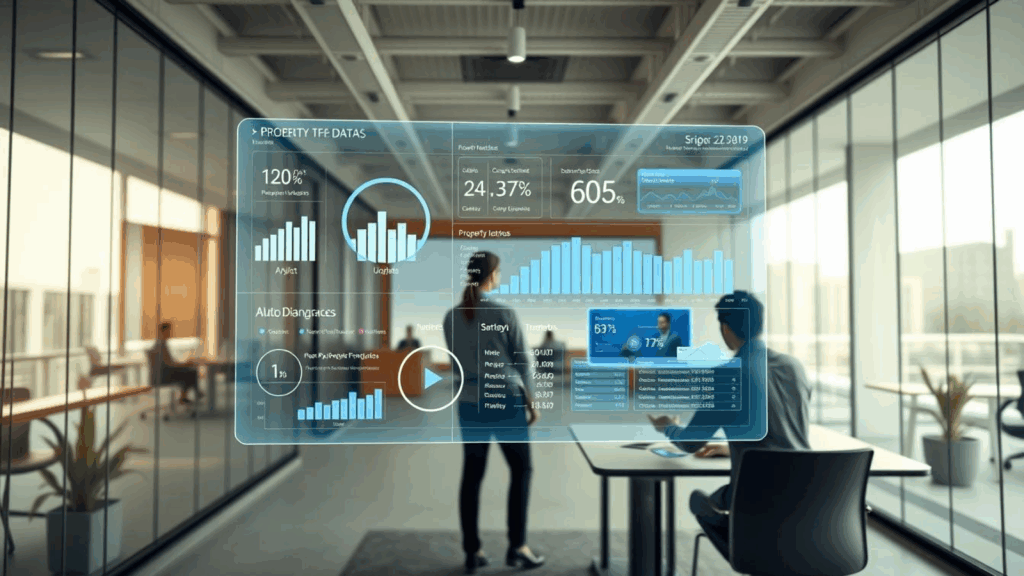Addressing tenant complaints is a crucial part of a property manager’s job. Mastering this aspect can significantly improve tenant satisfaction and make managing properties easier. By utilizing best practices in property management and strategies for landlord-tenant conflict resolution, a manager can create a happier living space.
Implementing a proactive approach is key. Introducing services and technology like property maintenance software can prevent small problems from becoming bigger issues. Also, having a structured plan for responses and preventative measures is essential for handling complaints effectively.
Key Takeaways
- Develop a proactive strategy to manage tenant complaints efficiently.
- Understand the nature of complaints to form effective responses.
- Implement technology to improve response times and communication.
- Effective landlord-tenant conflict mediation ensures better tenant relationships.
Understanding the Nature of Tenant Complaints
Effective dialogue with tenants is crucial for unraveling the core of their discomfort. Complaints may range from minor annoyances to major issues that challenge the property’s livability. Identifying the variety of these complaints allows managers to devise solutions that are both accommodating and align with legal standards.
To settle grievances effectively, it’s essential to genuinely listen and consider tenants’ viewpoints. This strategy can turn possible disputes into chances to strengthen bonds with tenants. Furthermore, adeptly navigating through tenant complaints enhances their contentment and boosts the property’s worth.
Effectively dealing with rental arguments demands empathy, legal insight, and strong communication skills. When property managers arm themselves with these abilities, they’re better poised to prevent problems from worsening. Open lines of communication make tenants feel appreciated and less inclined to contest.
Understanding tenant complaints and managing them strategically is key to a peaceful living space. Property managers who are proficient in these tasks help keep their properties desirable and respected in the rental sphere. Successfully resolving tenant issues is fundamental in property management, ensuring tenants’ happiness and promoting lasting tenancy.
Common Tenant Complaints and Their Solutions
Effective handling of tenant complaints is crucial for their satisfaction and retention. By understanding and resolving common issues, property management can greatly improve renter feedback and operations.
Maintenance concerns like leaky faucets and HVAC troubles frequently trouble tenants. Addressing maintenance quickly can significantly boost tenant happiness. Creating a fast response system helps property managers tackle these issues effectively.
Managing utility expenses is key for many tenants who struggle with high bills. By educating tenants on energy efficiency and introducing energy-saving appliances, managers can aid in reducing these costs and enhancing tenant contentment.
To address rent issues, clear and empathetic communication is crucial. Tenants may have doubts regarding rent policies or increases. Clear, compassionate communication about the services and value provided can establish trust and limit confusion.
Here are some typical complaints and their solutions:
| Complaint | Suggested Solution |
|---|---|
| Maintenance Issues | Implement rapid response systems; schedule regular inspections. |
| Utility Costs | Educate on energy-saving practices; install energy-efficient appliances. |
| Rent Concerns | Communicate value and services provided; start with clarity and empathy. |
| Pests | Regular pest control treatments; prompt responses to infestations. |
| Safety Issues | Ensure proper lighting; regular safety inspections. |
| Communication Gaps | Set clear communication channels; use technology for updates. |
By making renter feedback processes more streamlined, property management can drastically better tenant relations and overall management. Swiftly and effectively addressing these concerns demonstrates a dedication to tenant welfare, leading to a more positive rental experience.
Creating a Proper System for Complaint Management
For property managers, maintaining tenant satisfaction is crucial. An efficient complaint management system plays a key role. It aids in tracking and resolving complaints timely, fostering transparency throughout.
Integrating property management software tools can greatly improve this process. These digital solutions enable organized tracking of tenant issues. They help prioritize complaints, ensuring urgent matters are addressed swiftly. This approach significantly boosts tenant satisfaction.
To implement an effective complaint management system, follow these guidelines:
- Digital Tracking: Utilize software tools for systematic complaint logging and tracking, preventing any issue from being overlooked.
- Prioritization: Sort complaints based on urgency and impact, focusing on critical issues first.
- Transparency and Communication: Keep tenants updated on their complaint status, strengthening trust and satisfaction.
- Assessment and Feedback: Consistently review complaint data to pinpoint and preempt recurring issues.
Employing a solid complaint management system and integrating state-of-the-art property management software tools guarantee efficient issue tracking. This method not only improves service quality but also ensures tenant happiness and smoother operations of properties.
Effective Communication with Tenants
Effective communication plays a vital role in nurturing a positive landlord-tenant relationship. It requires prompt responses to tenant complaints, showing outstanding customer service. Keeping tenants informed about their issue’s status is crucial.
Employing multiple channels for communication can significantly improve interactions. Offering phone, email, and online portal options allows tenants to communicate conveniently. They can pick the method that works best for them, ensuring timely exchanges.
Empathy in conversations is critical for a positive rapport. Property managers showing understanding in their responses foster trust. Training sessions for staff should focus on customer service excellence to bolster tenant relationships.
It’s essential to keep tenants updated on their complaints’ resolutions. Providing regular progress reports mitigates frustration and showcases a landlord’s dedication to service. A clear and consistent communication approach enhances tenant satisfaction.
Responding to Maintenance Requests
Addressing maintenance requests promptly is crucial for the satisfaction of tenants and the upkeep of the property. By handling these requests on time, property managers embrace a proactive stance in managing their properties.
An effective method involved is categorizing maintenance requests according to their urgency. Important issues, like plumbing leaks or heating failures, must be tackled immediately. The fast resolution of these issues guarantees the safety and comfort of the tenants.
On the other hand, scheduled repair solutions are best for less urgent issues. By conducting regular maintenance checks, property managers prevent small problems from escalating. This strategy also elevates the overall condition of the property.
Here is an outline for addressing various maintenance requests:
| Category | Description | Action |
|---|---|---|
| Urgent | Issues affecting habitability or safety | Immediate response and repair |
| Non-Urgent | Minor repairs or cosmetic issues | Schedule at a convenient time |
| Preventative | Regular maintenance checks | Scheduled repair solutions |
Efficient handling and categorizing of maintenance requests allow property managers to effectively solve problems. This strategy not only boosts tenant satisfaction but also maintains the property’s stellar condition.
Proactive Measures to Prevent Complaints
To keep tenants satisfied and retain them, having a solid strategy is key. By conducting regular property checks, managers can preemptively solve issues. These checks not only keep the place in good condition but show care for tenant welfare. This approach greatly aids in keeping tenants long-term.
Preventative maintenance strategies are essential to avoid expensive repairs later. By regularly servicing key systems like HVAC, plumbing, and the roof, properties remain in prime condition. This reduces tenant inconvenience and improves their living experience.
Best practices for property upkeep include modernizing appliances and features. Updating these elements can address frequent complaints regarding inefficiency or breakdowns. Such improvements significantly increase tenant contentment and encourage longer leases.
Adding services such as renter’s insurance can be a pivotal part of keeping tenants. It assures them of coverage in unexpected situations, building a strong sense of security and loyalty towards the management.
Legal Considerations in Handling Tenant Complaints
For property managers, understanding and adhering to legal responsibilities is crucial when dealing with tenant complaints. It’s essential for ensuring fair housing compliance and reducing the chances of disputes. Being well-informed about landlord-tenant laws is key.
Priority should be given to health and safety issues. Addressing these complaints swiftly is necessary to meet legal obligations. It ensures the well-being of tenants and reduces the risk of legal actions.
Keeping detailed records of all interactions with tenants is vital. Such documentation aids in navigating landlord-tenant laws and creates a definitive timeline of events. This is extremely useful during legal disputes or investigations.
It’s important for property managers to keep up with any changes in laws affecting their practices. Regularly updating their knowledge and ongoing training in landlord-tenant laws helps prevent accidental law violations. It also maintains compliance with fair housing standards.
| Legal Consideration | Importance | Action Steps |
|---|---|---|
| Health and Safety Concerns | High | Immediate action and proper documentation |
| Record Keeping | Crucial | Maintain detailed records of interactions and complaints |
| Stay Informed on Laws | Ongoing | Regular training and updates on landlord-tenant laws |
Feedback and Continuous Improvement
Utilizing tenant feedback is key in enhancing property management. By proactively collecting and analyzing responses, managers can fix issues early. This proactive measure improves service and the living quality for all residents.
Tenant engagement through surveys and conversations highlights the value of their opinions. Feeling heard builds a community and trust atmosphere. Using updated satisfaction surveys and suggestion boxes is crucial for gathering valuable feedback. The aim is to discover improvement areas and make changes that benefit tenants.
Responsive actions to feedback enable managers to refine services and ensure tenant happiness. Continuous improvement goes beyond solving immediate grievances. It involves creating an environment that prevents problems. This strategy is essential for fostering long-term satisfaction and keeping tenants. It also contributes to a more effective property management approach.
FAQ
How can property managers effectively handle tenant complaints?
To effectively handle tenant complaints, property managers must grasp the issues’ nature. Forming a structured reply plan is crucial. They should use technology like property maintenance software. This enhances response times and communication. By being proactive and offering useful services, many problems can be avoided.
What are common types of tenant complaints?
Common tenant complaints involve maintenance, outdated appliances, high utility bills, rent disputes, pests, safety concerns, and poor communication. Understanding these helps in providing effective, legally sound solutions.
How can property managers resolve maintenance issues efficiently?
To resolve maintenance efficiently, sort issues by urgency. Immediately fix critical ones affecting habitability. Schedule non-urgent matters properly. Regular inspections and preventative maintenance maintain high living standards.
What is the best way to manage rental disputes?
Handling rental disputes requires understanding tenants’ issues. Form a structured reply strategy, and communicate well. Adhering to legal duties and prioritizing health and safety issues are key.
How can property managers create a proper system for complaint management?
A thorough complaint management system enables efficient tracking and swift action. Embracing digital tools boosts transparency and accountability. This ensures timely responses and impartiality in handling complaints.
What are some proactive measures to prevent tenant complaints?
Proactive strategies include regular check-ups, upgrading appliances, and offering valuable services. These approaches anticipate and solve potential problems. They drive tenant satisfaction and retention.
Why is effective communication with tenants important?
Effective communication makes tenants feel respected and attended to. It’s vital to quickly address complaints. Keeping tenants updated and training staff in empathetic service fosters trust and a positive experience.
What are the key legal considerations in handling tenant complaints?
Property managers must comply with housing and landlord-tenant laws. They should focus on health and safety, keep detailed records, and stay updated on legal requirements. This ensures fair, legal resolutions.
How can tenant feedback be leveraged for continuous improvement?
Tenant feedback drives continual enhancement in property management. Engaging tenants through surveys and talks shows their input is valued. Such proactive engagement spurs efficient upgrades, nurturing a community that supports long-term satisfaction and retention.






